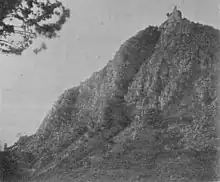| Battle of Ostrvica | |||||||
|---|---|---|---|---|---|---|---|
 Mount Ostrvica | |||||||
| |||||||
| Belligerents | |||||||
| Ottoman Empire | Serbian Despotate | ||||||
| Commanders and leaders | |||||||
| Mehmed the Conqueror | Đurađ Branković | ||||||
| Strength | |||||||
| 10,000 cavalry[1] | 9,000 cavalry[2] | ||||||
The Battle of Ostrvica was Mehmed the Conqueror's successful attack on the Ostrvica Fortress in 1454 during his first Serbian campaign.
Before
After the death of Sultan Murad II and the conquest of Istanbul, the Serbian despot sent a delegation to the Ottoman ruler who was in Edirne. He was presented with the keys to some of the castles that belonged to the Ottomans, as well as being congratulated. At the same time, with the encouragement of the Pope, the Despot met with the Hungarians to participate in a new Crusade, which was intended to be prepared against the Ottomans. The Ottomans learned about the Serbian-Hungarian contacts of the Serbian despot against them through their spies and prepared accordingly.[3]
After the Ottoman court asked the Serbian delegation for the keys to other castles which belonged to them but were passed onto the Serbs, they were refuted. Thereupon, a campaign was made against Serbia in the spring of 1454.[3]
Battle
Mehmet led this expedition in 1454. His intention was to cross enemy territory and destroy everything. During the quick expedition, thousands of prisoners were taken and brought to Istanbul as a new Christian population. Trapped in Smederevo, the cavalry sent against him by the despot (a Venetian visiting John Hunyadi says he had 9,000 horsemen) was easily repulsed. Mehmed the Conqueror arrived in Ostrvica, where Branković had many assets, and easily took the castle.[2]
References
- ↑ Bitlisi, İdris-i (2013). Heşt Behişt VII. Türk Tarih Kurumu. ISBN 9789751626363.
- 1 2 Jorga, Nicolae (2018). Büyük Türk - Fatih Sultan Mehmed. Yeditepe Yayinevi. p. 73. ISBN 9786052070383.
- 1 2 Uzunçarşılı, İsmail Hakkı (2012). Osmanlı Tarihi-II: İstanbul’un Fethinden Kanuni Sultan Süleyman’ın Ölümüne Kadar (Kapak değişebilir). Türk Tarih Kurumu Yayınları. ISBN 9789751600127.